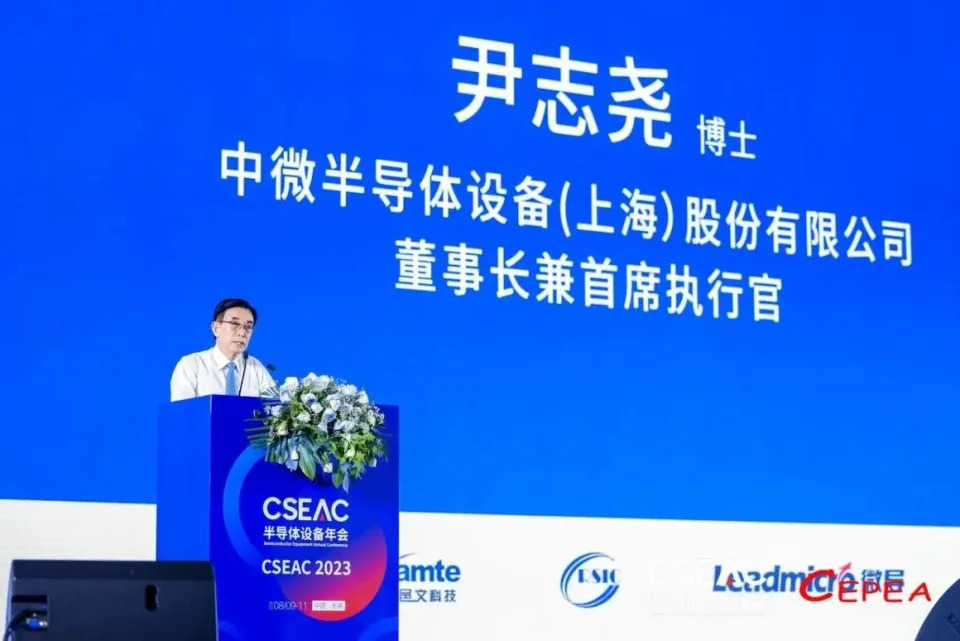The head of one of China's leading semiconductor equipment makers believes Washington's escalating export and investment restrictions betray the real goal of the US: keep China's chip-making technology at least five generations behind the cutting edge.
Advanced Micro-Fabrication Equipment Inc China (AMEC) chairman and CEO Gerald Yin Zhiyao made the comments on Thursday at the China Semiconductor Equipment Annual Conference in Wuxi, a city near Shanghai in eastern China. He referred to the US export restrictions imposed last October, which came ahead of another escalation this week when the Biden administration unveiled plans to restrict investment into China in sensitive areas including semiconductors.
"The October rules really exposed the US' true intention, which aims to fix China's chip-making on 28-nanometre, at least five generations behind the global leading edge of 3-nm to 14-nm," Yin said during his talk at the conference. "We can't accept [this]," he added.
Do you have questions about the biggest topics and trends from around the world? Get the answers with SCMP Knowledge, our new platform of curated content with explainers, FAQs, analyses and infographics brought to you by our award-winning team.

Advanced Micro-Fabrication Equipment Inc China (AMEC) chairman and CEO Gerald Yin Zhiyao speaks at the China Semiconductor Equipment Annual Conference in Wuxi on August 10, 2023. Photo: qq.com alt=Advanced Micro-Fabrication Equipment Inc China (AMEC) chairman and CEO Gerald Yin Zhiyao speaks at the China Semiconductor Equipment Annual Conference in Wuxi on August 10, 2023. Photo: qq.com>
Yin described the updated US tech export controls targeting all China-based foundries as the most "lethal" ban since the US started rolling out related sanctions on China's hi-tech firms in 2019. Yin called the latest executive order - which targets US investment into China's semiconductor, artificial intelligence and quantum computing industries - as Washington's "16th move" against the country since then.
The rules imposed last October aim to cap China's logic chip-making capabilities at the 14-nm level, DRAM chips at 18-nm and 3D NAND memory at 128 layers. The US cited national security risks and the potential military applications of advanced chips.
Yin, a 20-year veteran of the US chip equipment industry including time at Applied Materials, said locally-procured semiconductor equipment in China's foundries accounted for just 15 per cent of the total. The other 85 per cent of machines come from the US, Netherlands and Japan, he said.
"That's why the US needed Japan and Netherlands on board to curb our development," he told a room packed with semiconductor professionals and investors.
Chinese semiconductor equipment firms still lag global peers in both market share and technological sophistication, according to industry professionals attending the conference. China's tool makers have virtually no global presence in some segments such as lithography. Catching up in these areas is an uphill battle for Chinese firms in a worsening geopolitical environment that is squeezing out foreign money and technological cooperation.
Li Jinxiang, deputy secretary general of China Electronic Production Equipment Industry, said some China-made equipment fails to meet the efficiency needs of foundries.
"It's a huge waste that a 1 billion yuan [US$138.7 million] ASML-made lithography machine has to wait for a domestically-made wafer coating and developing machine to catch up in speed," Li said, referring to the Dutch chip equipment firm that has a virtual monopoly on the most advanced lithography machines.
An ASML lithography machine is capable of processing 350 12-inch wafers per hour, Li explained, while China-made wafer coating and developing machines cannot match that output.
A wafer coating and developing machine is crucial in assisting the lithography process. It applies the light-sensitive photoresist material to the wafer, which is then put into lithography systems for exposure. The machine then takes the exposed wafer to develop the pattern.
However, Yin said he has confidence that China can develop a globally competitive equipment industry within years, as many US-trained Chinese experts have returned home. Using chip-making equipment to curb China's progress will yield no good results, he said.
Yin also called AMEC's brief inclusion in 2021 on a US defence department list of companies allegedly supporting the Chinese military "sheer nonsense". It was the first time Yin publicly commented on the US sanctions against AMEC.
He said the US "reluctantly" removed AMEC from the list after "four months of intense negations".

 www.yahoo.com
www.yahoo.com
Advanced Micro-Fabrication Equipment Inc China (AMEC) chairman and CEO Gerald Yin Zhiyao made the comments on Thursday at the China Semiconductor Equipment Annual Conference in Wuxi, a city near Shanghai in eastern China. He referred to the US export restrictions imposed last October, which came ahead of another escalation this week when the Biden administration unveiled plans to restrict investment into China in sensitive areas including semiconductors.
"The October rules really exposed the US' true intention, which aims to fix China's chip-making on 28-nanometre, at least five generations behind the global leading edge of 3-nm to 14-nm," Yin said during his talk at the conference. "We can't accept [this]," he added.
Do you have questions about the biggest topics and trends from around the world? Get the answers with SCMP Knowledge, our new platform of curated content with explainers, FAQs, analyses and infographics brought to you by our award-winning team.

Advanced Micro-Fabrication Equipment Inc China (AMEC) chairman and CEO Gerald Yin Zhiyao speaks at the China Semiconductor Equipment Annual Conference in Wuxi on August 10, 2023. Photo: qq.com alt=Advanced Micro-Fabrication Equipment Inc China (AMEC) chairman and CEO Gerald Yin Zhiyao speaks at the China Semiconductor Equipment Annual Conference in Wuxi on August 10, 2023. Photo: qq.com>
Yin described the updated US tech export controls targeting all China-based foundries as the most "lethal" ban since the US started rolling out related sanctions on China's hi-tech firms in 2019. Yin called the latest executive order - which targets US investment into China's semiconductor, artificial intelligence and quantum computing industries - as Washington's "16th move" against the country since then.
The rules imposed last October aim to cap China's logic chip-making capabilities at the 14-nm level, DRAM chips at 18-nm and 3D NAND memory at 128 layers. The US cited national security risks and the potential military applications of advanced chips.
Yin, a 20-year veteran of the US chip equipment industry including time at Applied Materials, said locally-procured semiconductor equipment in China's foundries accounted for just 15 per cent of the total. The other 85 per cent of machines come from the US, Netherlands and Japan, he said.
"That's why the US needed Japan and Netherlands on board to curb our development," he told a room packed with semiconductor professionals and investors.
Chinese semiconductor equipment firms still lag global peers in both market share and technological sophistication, according to industry professionals attending the conference. China's tool makers have virtually no global presence in some segments such as lithography. Catching up in these areas is an uphill battle for Chinese firms in a worsening geopolitical environment that is squeezing out foreign money and technological cooperation.
Li Jinxiang, deputy secretary general of China Electronic Production Equipment Industry, said some China-made equipment fails to meet the efficiency needs of foundries.
"It's a huge waste that a 1 billion yuan [US$138.7 million] ASML-made lithography machine has to wait for a domestically-made wafer coating and developing machine to catch up in speed," Li said, referring to the Dutch chip equipment firm that has a virtual monopoly on the most advanced lithography machines.
An ASML lithography machine is capable of processing 350 12-inch wafers per hour, Li explained, while China-made wafer coating and developing machines cannot match that output.
A wafer coating and developing machine is crucial in assisting the lithography process. It applies the light-sensitive photoresist material to the wafer, which is then put into lithography systems for exposure. The machine then takes the exposed wafer to develop the pattern.
However, Yin said he has confidence that China can develop a globally competitive equipment industry within years, as many US-trained Chinese experts have returned home. Using chip-making equipment to curb China's progress will yield no good results, he said.
Yin also called AMEC's brief inclusion in 2021 on a US defence department list of companies allegedly supporting the Chinese military "sheer nonsense". It was the first time Yin publicly commented on the US sanctions against AMEC.
He said the US "reluctantly" removed AMEC from the list after "four months of intense negations".

US wants China's chip industry 5 generations behind cutting edge, head of equipment maker AMEC says at Wuxi conference
The head of one of China's leading semiconductor equipment makers believes Washington's escalating export and investment restrictions betray the real goal of the US: keep China's chip-making technology at least five generations behind the cutting edge. Advanced Micro-Fabrication Equipment Inc...


